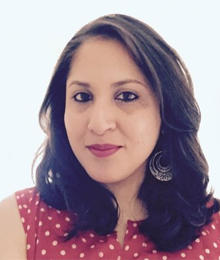An interview with Dr Prerna Vohra
January 2020
Dr Prerna Vohra is a lecturer in Microbiology at the University of Edinburgh and a member of the Microbiology Society. In this interview, she tells us more about her research on Salmonella, why better understanding of bacterial infections is important, and why microbiology matters.

Tell us a little about your current research.
I currently study a bacterium that is a global problem and causes infections in humans and animals alike – Salmonella. Farmed animals such as cattle are naturally-infected hosts and reservoirs of human infections, which are often a consequence of eating contaminated meat products, or from direct contact with infected animals.
In my current research, I am trying to identify the Salmonella genes involved in the infection process, to determine if all types of Salmonella pose an equal threat to food safety and to understand the immune responses elicited during infection. I use high-throughput sequencing methods and animal models to answer these questions. From the outcomes of these studies, we can identify bacterial and host targets to develop new and effective vaccines and interventions against Salmonella.
Why is this research important?
There are currently no effective vaccines to control Salmonella infections in cattle, and the economic burden of this pathogen is significant. We need to study several aspects of infection, from the perspectives of both the bacteria and the host, in order to develop effective vaccines and interventions, which would reduce the burden of Salmonella in cattle, improve animal health and productivity, and reduce the transmission of Salmonella to humans, consequently improving human health.
Why does microbiology matter?
Microbes are in us and all around us. Some are beneficial and some cause disease. Understanding how bacteria behave within our bodies, the processes they use to survive and how our bodies respond to them is key to understanding health and disease.


